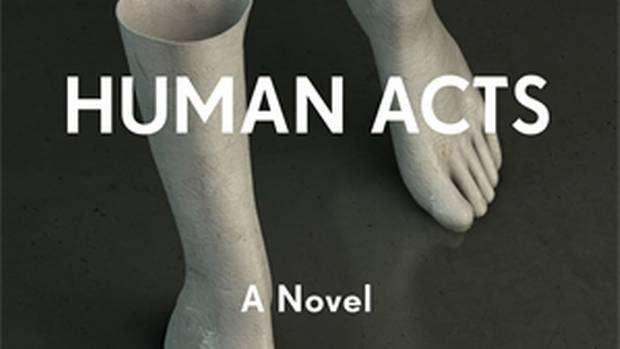Human Acts
 Written by Amy Badenhorst
Written by Amy Badenhorst
I never fully understood the sadness, violence, and blood shed that occurred during the 5.18 Gwangju uprising until I read Human Acts by Han Kang.
This book is a riveting, poetic, and powerful examination of humanity at its most appalling and its most hopeful. In a sequence of interconnected chapters, the victims and the bereaved encounter censorship, denial, forgiveness, and the echoing agony of the original trauma of 5.18 (May 18, 1980).
Human Acts is told from the viewpoints of different characters, all connected to Dong-ho, a 15-year-old boy looking for his best friend’s dead body. Dong-ho ends up volunteering at a gymnasium where many bodies of victims to the 5.18 trauma are being temporarily kept. Dong-ho’s best friend, Jeong-dae (who is himself just a boy) narrates after his own death from a rotting pile of corpses stacked in the shape of a cross. Eun-sook and Seon-ju, also two volunteers at the gymnasium, have chapters, as do Dong-ho’s mother and a writer who serves as a stand-in for Han Kang. As a whole, these sections make up a psychological autopsy of Gwangju and its victims, many of whom survived the massacre only to lose themselves in the tides of trauma. The characters, when speaking, frequently address an unnamed “you.” Sometimes “you” is the dead, occasionally it is the reader, but often, and most disturbingly, “you” is who each person was before dying in the violence and whom the speaker has now become irrevocably exiled from.
The final chapter of this novel is about the author’s own connection to the uprising. Gwangju is Han’s hometown; her family had moved to Seoul by the time of the uprising, although none of her relatives were killed. The result is torturously compelling: a relentless portrait of death and agony that never lets you look away. Han’s prose, as translated by Deborah Smith, is both spare and dreamy, full of haunting images in echoing languages. Choosing the novel as her form, Han then allows it to do what it does best: take readers to the very center of life that is not their own.
Human Acts is a radically brave novel about an atrocious episode in Korean history, but it is also a universal book, utterly modern but profoundly timeless.
The Author
Amy is from South Africa but has lived in Gwangju for six years and considers it her home. She is a freelance English tutor and has written for the Gwangju News on and off for over 4 years. In her free time, she enjoys walking around the Pungam-dong Lake with her dog Benji and reading anything written by Han Kang or Malcolm Gladwell. For inspiration, she drinks whiskey neat while listening to Keith Jarrett.







